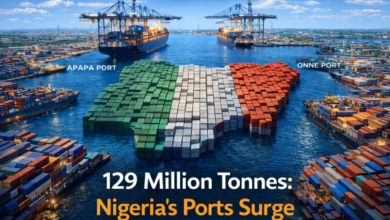New IMF boss Outlines Immediate Priority
 International Monetary Fund (IMF) has disclosed that its immediate priority is to help countries, including Nigeria to minimise their risk of economic crises.
International Monetary Fund (IMF) has disclosed that its immediate priority is to help countries, including Nigeria to minimise their risk of economic crises.
In a letter to the IMF’s Executive Board, the newly appointed Managing Director of the fund, Kristalina Georgieva said the Fund would not lose sight of its long-term objective, as it aims at helping countries cope with their downturns.
“As I noted in my statement to the executive board, our immediate priority is to help countries minimise the risk of crises and be ready to cope with downturns.
Yet, we should not lose sight of our long-term objective – to support sound monetary, fiscal and structural policies to build stronger economies and improve people’s lives. This means also dealing with issues like inequalities, climate risks and rapid technological change.”
The new IMF boss further expressed that she looked forward to working with all the Fund’s 189-member countries, the executive board and staff, and with all its partners in the years ahead.
READ ALSO: IMF Appoints New Managing Director As Lagarde Steps Down
With a population of almost 200 million people, Nigeria accounts for about 47% of West Africa’s population. With an abundance of resources, it is Africa’s biggest oil exporter, and also has the largest natural gas reserves on the continent.
World Bank reported that Nigeria emerged from recession in 2017, with a growth rate of 0.8%, driven mainly by the oil sector. Growth was higher in 2018 (at 1.9%) and more broad-based. However, it still fell below the population growth rate, government projections and pre-recession levels.
The oil and gas sector, according to the bank’s report, reverted to contraction from the second quarter of the year and the non-oil economy was thus the main driver of growth in 2018.
While agriculture slowed down significantly due to conflict and weather events, non-oil, non-agricultural growth, which remained negative up to the third quarter of 2017 strengthened through 2018 – but remained weak – with services (primarily information and communications technology) resuming as the key driver.
As the oil sector is not labour-intensive, and the non-oil economy was still relatively weak, nearly a quarter of the workforce was unemployed in 2018; and another 20% under-employed.
Georgieva, Bulgarian economist had been appointed to replace Christine Lagarde, who resigned to become head of the European Central Bank (ECB). Georgieva’s five-year term as Managing Director of the IMF will take effect on Tuesday, October 1, 2019.
Georgieva served as the interim President for the World Bank Group between February 1, and April 8, 2019.
Samson Oyedeyi










